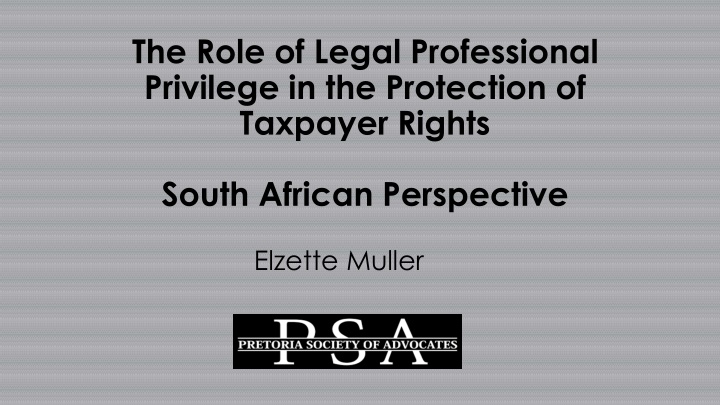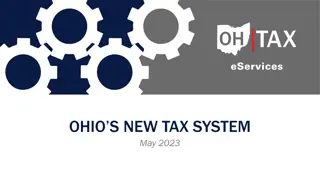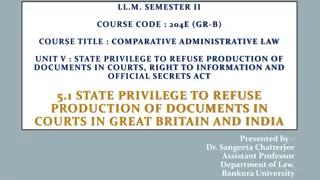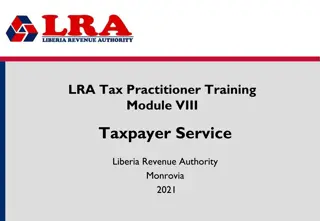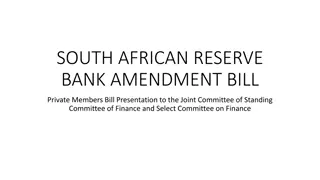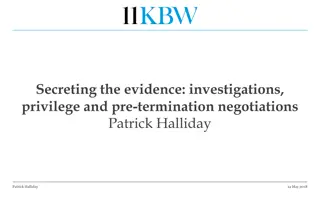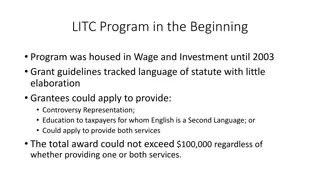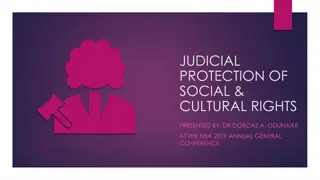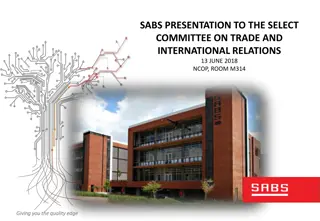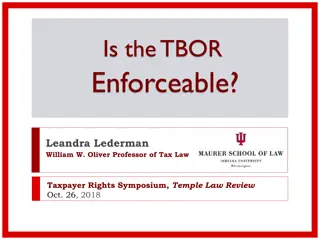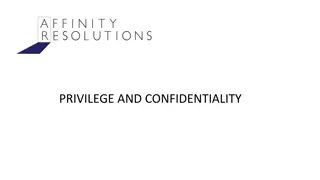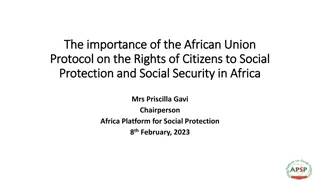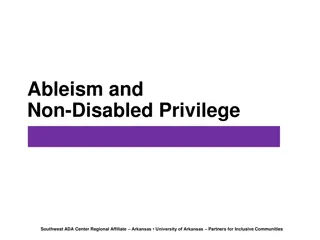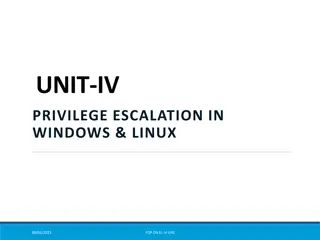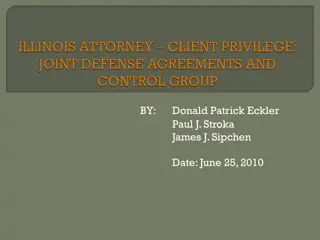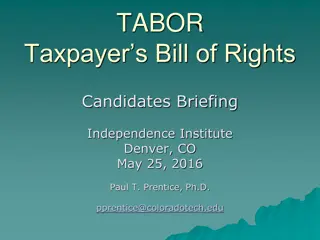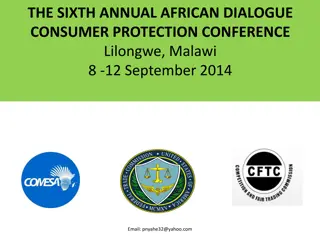Legal Professional Privilege in the Protection of Taxpayer Rights: South African Perspective
Legal professional privilege plays a crucial role in safeguarding taxpayer rights in South Africa. This privilege ensures that communications between a legal advisor and client remain confidential, promoting fairness in litigation and enabling a proper functioning adversarial system of justice. The origins, exceptions, and key legal cases highlight the significance and nuances of legal professional privilege in South African law.
Download Presentation

Please find below an Image/Link to download the presentation.
The content on the website is provided AS IS for your information and personal use only. It may not be sold, licensed, or shared on other websites without obtaining consent from the author.If you encounter any issues during the download, it is possible that the publisher has removed the file from their server.
You are allowed to download the files provided on this website for personal or commercial use, subject to the condition that they are used lawfully. All files are the property of their respective owners.
The content on the website is provided AS IS for your information and personal use only. It may not be sold, licensed, or shared on other websites without obtaining consent from the author.
E N D
Presentation Transcript
The Role of Legal Professional Privilege in the Protection of Taxpayer Rights South African Perspective Elzette Muller
Structure Legal Professional Privilege in South African Law Legal Professional Privilege and the Taxpayer - Administrative Process (SARS) - Adjudication of Objection and Litigation Issues for discussion
Legal Professional Privilege South African Law Origins of the rule English law Common law Initially rule of evidence Accepted as fundamental right - S v Safatsa 1988 (1) SA 868 (A)
Legal Professional Privilege South African Law Exceptions: Crime / Fraud: If client obtains advise to enable him to further a criminal end, does not operate, even if the legal advisor was ignorant of the illegal object LPP Waiver
Thint / Zuma v National Director of Public Prosecutions 2009 (1) SA 1 (CC) at para 184: The right to legal professional privilege is a general rule of our common law which states that communications between a legal advisor and his or her client are protected from disclosure provided that certain requirements are met. The rationale of this right has changed over time. It is now generally accepted that these communications should be protected in order to facilitate the proper functioning of an adversarial system of justice, because it encourages full and frank disclosure between advisors and clients. This, in turn, promotes fairness in litigation.
Thint / Zuma v National Director of Public Prosecutions 2009 (1) SA 1 (CC) at para 185: Accordingly, privileged materials may not be admitted as evidence without consent. Nor may they be seized under a warrant. They need not be disclosed during the discovery process. The person in whom the right vests may not be obliged to testify about the content of the privileged material. It should, however, be emphasised that the common-law right is to legal professional privilege must be claimed by the right- holder or by the right-holder s legal representative. The right is not absolute, it may, depending upon the facts of a specific case, be outweighed by countervailing considerations [i.e. the public interest override].
Amabhungane v Minister of Justice at para 116 and 117: I agree with the applicants that legal professional privilege is an essential part of the right to a fair trial and fair hearing This means that, although originally sourced from the common law, legal professional privilege is now undergirded by the Constitution. The proper functioning of our legal system is reliant on the confidentiality of communications between lawyer and client. That in turn promotes the rule of law. Thus the wholesale interception of lawyer client communications without any recognition of this legal, indeed constitutional, reality would be at odds with the rule of law .
Constitution 1996 Section 34: Everyone has the right to a fair public hearing before a court, or independent tribunal Section 36: A right may be limited only in terms of a law of general application to the extent that the limitation is reasonable and justifiable in an open and democratic society
Violation of Legal Professional Privilege If search and seizure results in violation of LPP, may potentially taint fairness of subsequent trial S v Mushimba 1977 (2) SA 829 (A)
Legal Professional Privilege and the Taxpayer Administrative process: request for relevant material: - Tax Administration Act 28 of 2011 (TAA) Adjudication and Litigation in the Tax Court: - TAA and Rules of the Tax Court
Production of Material to SARS Request for relevant material (TAA s46) Appear at tax inquiry (TAA s53) Search and seizure and warrant (TAA s60)
Claim for Legal Professional Privilege Procedural Mechanism TAA section 42A introduced in 2016 Taxpayer (or other person) must provide information to SARS or presiding officer to enable SARS to evaluate the assertion on privilege
Claim for Legal Professional Privilege Procedural Mechanism Description and purpose of each item Author and capacity Details of client Confirmation that client is claiming privilege If not in possession of client: obtained and under what circumstances and instructions? from whom
Claim for Legal Professional Privilege Procedural Mechanism If SARS disputes claim for LPP: Practitioner appointed - independent Determination within 21 days Application to court within 30 days
Adjudication of Objection and Litigation in Tax Court Tax Court Rules 6 & 8: SARS may request substantiating documents following the filing of an objection or an appeal Discovery of all documents material to a ground of appeal, except in case of valid objection to produce (Rule 36) Rule 56: Application to Compel
Issues for Discussion Extension to non-lawyers - In-house legal advisors Mohammed v President of RSA 2001 (2) SA 1145 (C) Accountants / Tax Practitioners? - Without prejudice discussions
